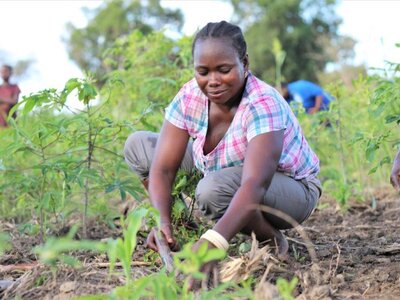Central African Republic
- 57%
- of people are food insecure
- 15%
- of the population is displaced
- 63%
- of people need humanitarian assistance
Despite its agricultural potential and mineral wealth, the Central African Republic (CAR) faces significant security issues and local inflation, worsened by global crises, all of which has led to a decline in living standards. A total 41 percent of the population has severe food insecurity.
The country has seen an influx of refugees due to the Sudan crisis, both Sudanese CAR returnees, in the northeastern region. Additionally, there are Chadian refugees and CAR returnees in the northwest.
These displacements significantly exacerbate food needs in areas already facing resource limitations, especially as they become isolated during the rainy season from June to December each year.
The World Food Programme (WFP) works to improve food security and nutrition for the most vulnerable people. WFP also addresses the root causes of hunger while strengthening local capacities and systems to enhance resilience against future shocks.
WFP plans to further integrate crisis response with early-recovery activities, assisting vulnerable populations in transitioning from crisis situations to conditional support, while bolstering food systems using home-grown school-meal programmes as a foundation.
What the World Food Programme is doing in Central African Republic
-
Emergency response
-
WFP plays a crucial role in emergency response efforts, addressing the urgent food and nutrition needs of vulnerable communities. By distributing food, including specialized nutritious products, and providing cash-based assistance, WFP ensures that those affected by conflict, instability and climate shocks can access essential resources. As conditions improve and stability returns to certain areas, WFP supports refugees and internally displaced people in their journey back home, focusing on rebuilding livelihoods. Additionally, WFP’s school-meal programmes enhance children's nutrition and encourage higher school attendance, fostering resilience in regions severely impacted by food insecurity.
-
Nutrition support
-
To help build long-term resilience, WFP is working to improve the nutrition of vulnerable groups including children, pregnant and breastfeeding women, people with disabilities and HIV patients. WFP is also implementing an operational pilot to improve coverage and quality for the supplementation treatment of moderate wasting (low height for age) in children under 5 and pregnant and breastfeeding nursing women. As part of our revised response operation, 36,000 children under 5 will receive specialized nutritious fortified foods each day, as part of a programme designed for the treatment and prevention of malnutrition. This programme also supports access to vaccination, improved water and sanitation, health training and women’s empowerment.
-
Support to community resilience
-
WFP supports smallholder farmers, households and communities in areas affected by shocks, and those hosting refugees and returnees, by helping them to restore and improve their productive assets. This aims to enhance food security, boost productivity and build resilience against future crises. Asset creation and livelihood activities offer the opportunity to integrate Smallholder Agricultural Market Support programmes. Thus, WFP ensure farmers and value chain actors have the capacity, technology and resources to grow crops, manage post-harvest losses, access markets, financing and other opportunities. This enables farmers to improve their incomes and strengthen their food and nutrition security, as well as to contribute to healthier, resilient, nutrition-sensitive and gender-transformative food systems. This local empowerment benefits broader communities as well, as WFP sources food for school meals and general distribution programmes from smallholder farmers – over 50 percent of whom are women.
-
Capacity strengthening
-
WFP is committed to building local capacity to enhance long-term food security and resilience. WFP collaborates with national institutions, local authorities and communities to strengthen their ability to design, implement and manage sustainable food systems and social safety nets. Through targeted training, technical assistance and knowledge sharing, WFP helps improve local capacities in areas such as supply chain management, nutrition and school-meal programmes. By empowering communities and government agencies, WFP’s capacity-strengthening efforts aim to reduce dependency on external aid and foster a self-sustaining approach to addressing food insecurity in CAR.
-
Support to the humanitarian community
-
WFP plays a critical role in supporting the humanitarian community, by providing essential logistics and communication services. Through the United Nations Humanitarian Air Service, WFP ensures reliable air transport to reach remote and insecure areas, where commercial flights are unavailable. WFP also leads the Emergency Telecommunications Cluster and the Logistics Cluster, offering vital communication and logistical support to humanitarian operations. These services enable fast, safe, and efficient access to vulnerable communities, facilitating lifesaving interventions and ensuring that humanitarian assistance reaches those in need, despite challenging conditions.
Publications
Central African Republic news releases
Go to pageFind out more about the state of food security in Central African Republic
Visit the food security analysis pageOperations in Central African Republic
Contacts
Office
Bangui Rue de l'amp #39 Universite, Bangui, Republique CentrAfricaine, BP 1048 Bangui, Republique CentrAfricaine
Bangui
Central African Republic


